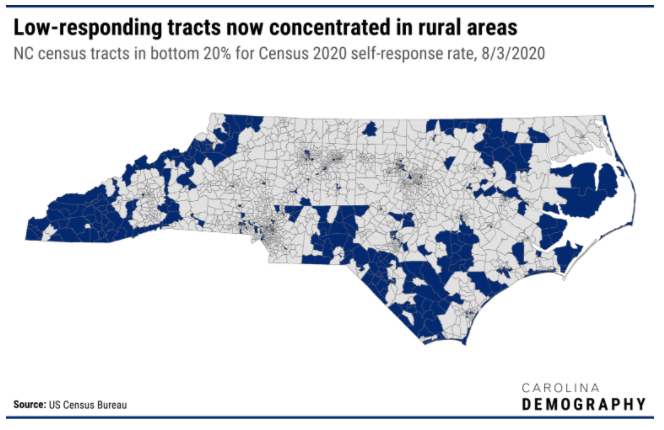Need to know: COVID-19
- As of noon on Friday, August 7, there were 132,812 confirmed cases. See cases by county here.
- The share of positive tests as a percentage of total tests remains at 8%.
- As of August 7, 1,123 people were hospitalized with ~26% of ICU beds available.
- From March 15 to August 6, 1,218,993 North Carolinians have filed unemployment insurance claims. The state has paid 845,655 claimants.
- On Wednesday, Gov. Roy Cooper extended Phase 2 for five weeks until September 11.
Dropping knowledge
As of August 2, 59% of North Carolina households had responded to the Census compared to 62.8% of households nationally. This response rate is below where it was at this point in 2010, and the Census Bureau announced this week it will end all counting efforts at the end of September, a month sooner than previously announced. Carolina Demography highlights key takeaways from the latest North Carolina Census response data, including:
- Low-responding tracts are now concentrated in rural areas, particularly those with low internet access.
- Low-responding tracts are more likely to have higher shares of Black, American Indian, or Hispanic/Latinx residents.
- There’s a widening gap between Census tracts in the bottom 20% of response rates and those in the top 20%.
See county-level response rates as of August 2 here.

Contextual healing
Brookings Institute’s Metro Recovery Watch recently highlighted Charlotte’s “Open for Business” plan to save small businesses as part of their Spotlight on Local Recovery Efforts series. According to the report, the Open for Business initiative consists of two phases: survive and thrive.
The survive phase focuses on getting support and resources to small businesses immediately and includes:
- Mentorship series connecting small businesses to industry experts and other owners
- A digital platform for small business owners to find resources and connect
- Access to capital program to distribute $30 million to small businesses
- Job training and capacity building for workforce development to serve displaced workers
The thrive phase will focus on resiliency and includes:
- A Resilient Restart program that provides coaching and mentoring to help small businesses develop resilient business plans
- Expanding workforce development initiatives, including Thrive Hiring Grants that incentivize employers to hire displaced workers
What we're reading
Resource | Tracking NC school district reopening plans
The North Carolina School Board Association created a spreadsheet tracking school district reopening plans. See it here. ... Read the rest-
More Farmers Declare Bankruptcy Despite Record Levels of Federal Aid
-
Licensure reform will be critical to stimulating future job growth.
-
To Combat the ‘COVID Slide,’ Tutoring Program Pairs Elementary Schoolers with College Students
-
The co-ops that electrified Depression-era farms are now building rural internet
-
Americans Aren’t Making Babies, and That’s Bad for the Economy
-
For Tenants Facing Eviction, Legal Representation Could Make All the Difference


